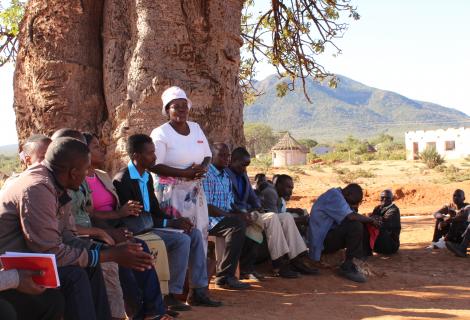
ActionAid prioritises the leadership of women and young people, especially those living in poverty and exclusion, in our efforts to achieve social justice, gender equality and poverty eradication. We believe that every person has the right to participate in decision making that affects them, at every level, and we will step up efforts aimed at enhancing democracy through participation of excluded individuals and groups in decision making.
The Universal Declaration of Human Rights (UDHR), 1948, provides that ‘everyone has the right to take part in the government of his/her country, directly or through freely chosen representatives’[1]. Elections, in theory, are important for participation as they provide a means for the voices of excluded groups to be heard and to influence the political agenda. Unfortunately, the experience to date, particularly for women and young people from the most marginalised and excluded communities, has been one of failed promises, dashed hope, and a need for change. Such barriers limit realisation of the great promises of democracy that women and young people hope to realise, including improved livelihoods, citizen participation, gender equality, empowerment of young people and the creation of an environment that upholds human and peoples’ rights.
The COVID-19 pandemic will disproportionately impact excluded groups especially those that continue to face multiple intersecting forms of discrimination based on gender, age, ethnicity, class, caste, occupation, migrant status, religion etc.
Many countries are experiencing a shrinking of political space for citizens to express their opinions and organise. It is critical to extend and defend electoral processes to allow citizens to exercise their rights to choose those who control power and hold them accountable. These three case studies from Kenya, Nigeria and Zimbabwe show how approaches can be applied, even in highly restrictive or discriminatory circumstances. From raising awareness of rights at grassroots level, to devising Citizen’s Manifestos and demanding adherence to international and regional conventions, ActionAid has worked closely with civil society to strengthen citizens engagement in a fair electoral process. A commitment to the principle of participatory inclusive democracy underpins them all.
The stories
From Kenya is the inspiring story of how Feddis Mbura, a woman from a poor community in Mombasa, was supported through the arduous journey to represent her community as a member of the Mombasa County Assembly. She had to overcome patriarchy that discriminates against women particularly from poor backgrounds. It was a struggle that demanded not only huge personal commitment from Feddis herself but also organisation and support from Sauti Ya Wanawake, a Kenyan women’s movement and ActionAid Kenya’s partner. This case study demonstrates how women and grassroots organisations can overcome systemic injustice.
From Nigeria, the story is of an ambitious programme to strengthen participation in the electoral process, particularly by marginalised groups including women, young people, and people with disabilities. While this project has been unable, on its own, to reform the troubled record of electoral democracy in Nigeria, it has embedded, particularly at local level, a demand for participation and accountability. Not only have marginalised groups become more aware and demanding of their rights but new inclusive institutional structures have also been built and commitments from authorities gained. This case study demonstrates the importance of reaching out to the most marginalised, civil society collaboration and constructive engagement with authorities.
The Zimbabwe story is a case study of refusal to abandon justice in the face of repression. Civil society has a vital role to expose and address the barriers to participation and to find methods to raise legitimate concerns and demands. The Citizens’ Manifesto has been one approach, used to raise citizens’ priorities and make demands of those seeking or holding power. Also, in the absence of political freedom internally, Zimbabwe civil society is demanding that the government acts in accordance with the international and regional conventions it has adopted. The African Charter on Democracy, Elections and Governance (ACDEG), sets standards for electoral processes that can be lobbied for in a non-partisan approach. ACDEG is seen as a critical convention by civil society in many African countries with the expectation that it can provide pressure for reform at both grassroots and continental leadership levels. However, the maltreatment of Joana Mamombe, MP for Harare West, and the youngest woman representative in the Zimbabwe parliament, is a stark warning of the risks faced by those who confront injustice.
In all these cases, ActionAid has supported civil society to make demands for citizens participation on a strictly non-violent and non-partisan basis. It is easy for authorities to dismiss demands for accountability as ‘political’. But as Joy Mabenge, Country Director of ActionAid Zimbabwe, asserts, “Electoral matters are political matters, so there is nothing wrong with civil society dealing with political matters, ensuring the push for electoral democracy etc. But civil society must remain non-partisan, meaning that it is not inclined towards any political party at any point in time… We unapologetically take sides with people living in poverty, exclusion and those that are vulnerable in society.”
[1] Universal Declaration of Human Rights (UDHR), article 21, https://www.ohchr.org/en/udhr/documents/udhr_translations/eng.pdf